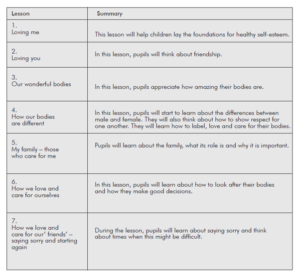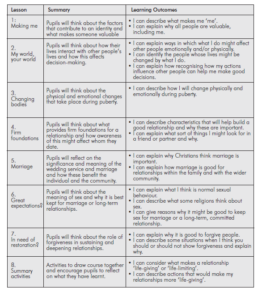SRE
Sex and Relationships Education (SRE)
As a part of your child’s educational experience at Mottram Church of England Primary School, we aim to promote personal wellbeing and development through a comprehensively taught programme of Personal, Social, Health and Economic (PSHE) education that gives children and young people the knowledge, understanding, attitudes and practical skills to live healthy, safe, productive and fulfilled lives, both now and in the future, to ‘live life in all its fullness’ – John 10:10. Our PSHE curriculum can be found here:
https://mottram.tameside.sch.uk/wp-content/uploads/2022/01/PSHE-Progression-2021.pdf
The Department for Education has made changes to Relationships and Sex Education following nationwide consultation which came into effect from September 2020 and all schools are required to comply with the updated requirements. The statutory guidance can be found at:
The guidance focuses on healthy relationships and keeping children safe in the modern world. It also covers a wide range of topics relating to physical and mental health, wellbeing, safeguarding and healthy relationships. For primary age children, this will cover:
Learning about the emotional, social and physical aspects of growing up will give children and young people the information, skills and positive values to have safe, fulfilling relationships and help them take responsibility for their own well-being.
From September 2020, Relationships and Sex Education (RSE), along with Health Education, will be statutory, and form part of the National Curriculum.
At Mottram Primary School, the new curriculum is to provide knowledge and understanding of safe and healthy relationships based on respect. This is to encourage the development of healthy relationships throughout life. The subject is designed to help children from all backgrounds build positive relationships, and to thrive in modern Britain.
You do have the right to withdraw your child from Sex Education delivered as part of SRE in primary school. However, there is no right to withdraw from Relationship Education, and we believe the content of these subjects – such as family, friendship, safety (including online safety) – are important elements for all children to be taught. We are confident you will share our enthusiasm for the successful implementation of the new curriculum, which we feel will benefit our children.
We will use the materials from the Salisbury Diocesan Board of Education and the Bristol Diocesan Board of Education who have collaborated with Hope’s Place to produce some wonderful materials. These lessons come from Love and Sex Matters, Relationships & Sex Education in a context of Christian values, a new resource that has been produced with church schools in mind. It aims to give children and young people a safe environment within which they can explore different perspectives on sex and relationships. At this stage, we are primarily concerned with enabling young children to develop and promote good self-esteem and awareness of themselves and others.
We view the partnership of home and school as vital in providing the context to both complement and reinforce what pupils learn at home about healthy, respectful relationships, focusing on family and friendships, in all contexts, including online, as well as how to be healthy.
Below, we have explained some of the common questions around these subjects.
So why now?
The Equality Act came into force in 2010. The Equality Act 2010 states that it is against the law to discriminate against anyone because of:
- Age
- Disability
- Gender reassignment
- Marriage or civil partnership
- Pregnancy or maternity
- Race
- Religion or belief
- Sex/gender
- Sexual orientation (Government, 2010, p1)
The public sector Equality Duty came into force on 5th April 2011 and requires that public bodies (including schools):
- Have due regard to the need to eliminate discrimination
- Advance equality of opportunity
- Foster good relations between different people when carrying out their activities. Page 2 (Government Equalities Office 2013, p1) This makes it clear that promoting some of the protected characteristics of the Equality Act while ignoring others is against UK law.
What is teaching about equality?
It is teaching about:
- Difference
- Acceptance
- Tolerance
- Diversity
- How to challenge discrimination
Teaching about equality helps our children to prepare for the next stages in their lives. We promote these protected characteristics throughout our curriculum and in our Collective Worship where we follow No Outsiders. The plan for the whole school can be found here: https://mottram.tameside.sch.uk/wp-content/uploads/2022/01/No-Outsiders-in-Our-School-Plan-Diversity-and-Equality-integrated-in-CW.pdf
Will my child be taught sex education at Primary School? Is this too young?
Sex education at Primary school is not compulsory. However, compulsory Relationships Education is being introduced in Primary schools from September 2020, to put in place the building blocks needed for positive and safe relationships of all kinds. This will start with family and friends and how to treat each other with kindness and compassion.
How the SRE curriculum will be delivered at Mottram.
The SRE curriculum is designed to help children from all backgrounds build positive and safe relationships, and to thrive in modern Britain. We believe that teaching through the Love and Sex Matters, Relationships & Sex Education in a context of Christian values resource builds on our Christian Values and Vision for the school.
Love and Sex Matters Years 1, 2 & 3
Lesson Overview

This is an extract from the Key Stage 1 book:
Love and Sex Matters Years 4, 5 & 6
Lesson Overview

Love and Sex Matters 3-Year Plan
Love and Sex Matters 3 Year Plan Y1, 2 and 3
Love and Sex Matters 3 Year Plan
Love and Sex Matters 3 Year Plan Y4, 5 and 6
At Mottram, we ensure that any teaching and materials are appropriate having regard to the age and religious backgrounds to our pupils. We also take into consideration other factors, such as any special educational needs or disabilities of our pupils.